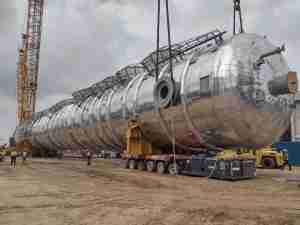Fitch: Concession Provisions Mitigate Delay Risk for Kentucky Wired Infrastructure Co.
posted by AJOT | Aug 24 2016 at 11:28 AM | Maritime
Construction delays recently reported by The Kentucky Wired Infrastructure Company, Inc. (KWIC) will not immediately impact the ratings on bonds issued on behalf of KWIC by the Kentucky Economic Development Finance Authority, according to Fitch Ratings.
KWIC has reported that its fiber optic network installation project is facing delays of up to one year as a result of challenges experienced in obtaining pole attachment agreements (PAAs) with telecommunications services providers. There is currently no rating impact as the project is protected from this type of delay risk, which is considered under supervening and compensation events of the concession agreement with the Commonwealth of Kentucky. The project company has filed a Supervening Event Notice, which is under review by the Commonwealth.
Delay risk is mitigated by extensions permitted by the Commonwealth of Kentucky. The project also has no exposure to potential cost overruns, which would be absorbed by the Commonwealth and/or the security package provided by the design-build (DB) contractors. The Commonwealth has expressed its continued support for the project, which is reflected in its budget allocation through fiscal year (FY) 2018 (ended June 30.) and timely availability payments which continue in full and as originally scheduled to meet debt service obligations despite construction delays.
The Commonwealth has recently executed PAAs with Windstream and AT&T, bringing the total percentage of poles covered by executed agreements to 75% (63,827 poles). Execution of these PAAs should allow follow-on construction activities to progress. Agreements which cover the remaining 25% of poles are still in the negotiation phase with utilities, but are expected to be resolved in the near term. PAAs allow the project to attach fiber optic cables to electric utilities’ and telecommunications companies’ poles and are a critical path item in construction. Delays in obtaining PAAs have therefore resulted in further delay of other construction activities, such as making certain sites ready for construction, procuring rights of way as needed to access to private land, obtaining permits and completing rings.
Given the Commonwealth’s acknowledgement of the supervening and compensation events, Fitch expects the Commonwealth to provide relief in the form of a schedule extension. Fitch believes the project’s ability to meet the current long stop date of July 31, 2019 is highly uncertain. Failure to meet the long stop date is an event of default, but the DB contractors, project company and Commonwealth are working together now to avert this 2019 scenario. Fitch expects a revised schedule to maintain about a one-year difference between the new substantial completion date and long stop date, allowing sufficient scheduling allowance for any other unexpected delays.
However, the exact length of the extension and a new long stop date for the concession agreement remain undetermined. Fitch envisions that both sides will contribute to a solution where the DB contractors deploy resources to make up for lost time to the extent feasible and the Commonwealth minimizes its absorption of schedule extensions and costs. Fitch will evaluate whether the newly established schedule including a revised long stop date leaves the project with an adequate allowance for project completion.
The project has sufficient liquidity to meet expenses and debt service obligations in the near term. Monthly availability payments from the Commonwealth started at $29,000 and will ramp to a total of $11.8 million for FY2017. Availability payments are not affected by the Commonwealth’s efforts to obtain federal funding contributions. The project has an estimated $180 million in bond proceeds to support capitalized interest. The project also has access to the DB contractors’ letter of credit, equal to 10% of the contract amount to support the contractors’ obligations. Potential cost overruns for ‘make ready’ activities, which support the preparation of poles for construction, are absorbed by the DB contractors. The impacts of the aforementioned delays seem to be adequately mitigated at this time given the expected scheduling extension alongside the project’s available liquidity and security package. Should the project fail to reach agreement on an adequate extension from the Commonwealth in a timely manner or experience any shortfall in necessary liquidity, negative rating action will be warranted.










